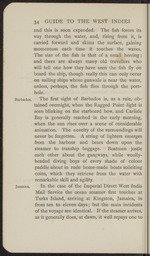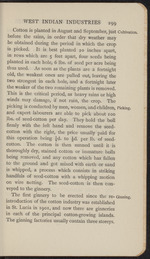|
|
|
Your search within this document for 'yerba,hole' resulted in three matching pages.
|
| 1 |
 |
“...GUIDE TO THE WEST INDIES
and this is soon expended. The fish forces its
way through the water, and, rising from it, is
carried forward and skims the surface, gaining
momentum each time it touches the waves.
The size of the fish is that of a small herring;
and there are always many old travellers who
will tell one how they have seen the fish fly on
board the ship, though really this can only occur
on sailing ships whose gunwale is near the water,
unless, perhaps, the fish flies through the port-
hole.
The first sight of Barbados is, as a rule, ob-
tained overnight, when the Ragged Point light is
seen blinking on the starboard bow, and Carlisle
Bay is generally reached in the early morning,
when the sun rises over a scene of considerable
animation. The novelty of the surroundings will
never be forgotten. A string of lighters emerges
from the harbour and bears down upon the
steamer to tranship baggage. Boatmen jostle
each other about the gangways, while woolly-
headed diving boys of every shade...”
|
|
| 2 |
 |
“.../
Sports.
Cricket.
Tennis.
Golf.
Boating
and
Bathing.
Shooting.
Fishing.
Social
Club.
Principal
Sights.
The
Cathedral.
208 GUIDE TO THE WEST INDIES
two, 2S* 6d.; buggy for three, 4s.; Central Factory,
4s. and 6s.; Wallings Reservoir, 10s. and 14s.;
Fig Tree Hill, 12s. and 16s.; English Harbour;
14s. and 20s.
Cricket, tennis, rifle-shooting, and golf are the
chief amusements. There is a nine-hole golf
course near St. John’s, and good boating in
St. John’s and Parham Harbours, while capital
bathing can be indulged in near St. John’s, and,
indeed, all round the coast. Good sport with
deer, wild duck, guinea birds, and pigeons is to
be had in Barbuda (see above), off which island
tarpon fishing also gives good sport. A license
for deer costs j£i; and for other game, 10s.
The New Club, near Government House, “is
noted for its hospitality, and the principal London
papers and magazines can be seen at the Public
Library, which is situated in High Street, near
the landing-place.
The town of St....”
|
|
| 3 |
 |
“...WEST INDIAN INDUSTRIES 299
Cotton is planted in August and September, just Cultivation,
before the rains, in order that dry weather may
be obtained during the period in which the crop
is picked. It is best planted 20 inches apart,
in rows which are 5 feet apart, four seeds being
planted in each hole, 6 lbs. of seed per acre being
thus used. As soon as the plants are a fortnight
old, the weakest ones are pulled out, leaving the
two strongest in each hole, and a fortnight later
the weaker of the two remaining plants is removed.
This is the critical period, as heavy rains or high
winds may damage, if not ruin, the crop. The
picking is conducted by men, women, and children, Picking,
and expert labourers are able to pick about 100
lbs. of seed-cotton per day. They hold the boll
firmly with the left hand aud remove the seed-
cotton with the right, the price usually paid for
this operation being |d. to Jd. per lb. of seed-
cotton. The cotton is then sunned until it is
thoroughly dry, stained cotton...”
|
|
|
